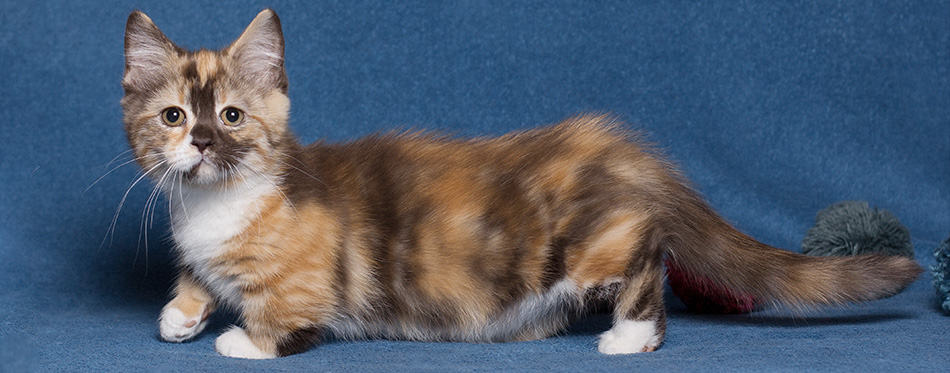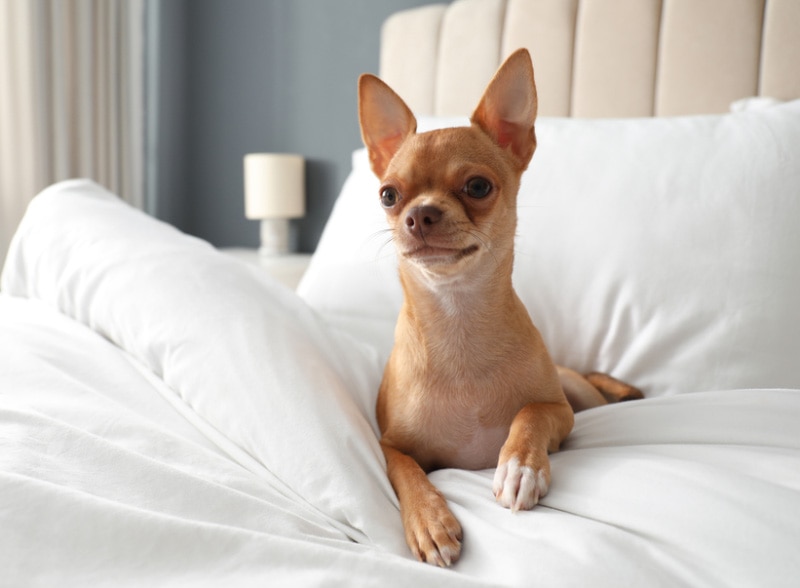Long-Haired Munchkin Cat – Facts, Origin & History (With Pictures)

Updated on
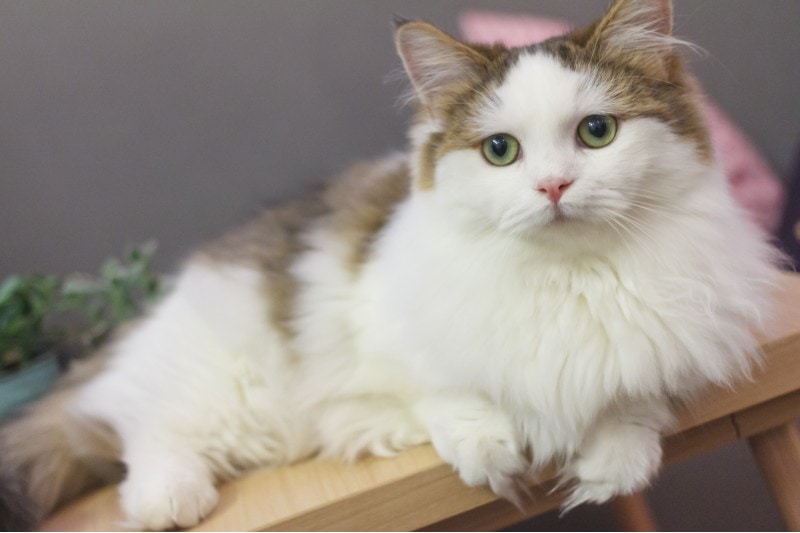
| Height: | 6–10 inches |
| Weight: | 5–11 pounds |
| Lifespan: | 12–15 years |
| Colors: | Comes in any coat color and pattern (even hairless!) |
| Suitable for: | Families with older children, multi-pet homes, apartment dwellers |
| Temperament: | Friendly, active, confident, playful |
Dogs have Dachshunds, cats have Munchkins. In fact, they’re also known as “sausage” cats! The Long-haired Munchkin is one of the most adorable cats you’ll ever come across. Watching them waddle on those short legs is guaranteed to put a smile on your face and fill your camera roll with kitty pics.
But don’t let those stubby legs fool you. Munchkins have huge personalities and a ridiculous amount of energy! They’re basically furry race cars, zooming around your home and trying to play with anyone or anything they come across.
On the other hand, the Munchkin cat breed remains controversial. Some argue that their short legs are the result of a genetic defect and shouldn’t be encouraged. Others claim that the breed has been around for centuries and is no more unnatural than any other.
Keep reading to learn more about the Long-haired Munchkin cat so you can form your own opinion about one of the most unique breeds around!
Long-Haired Munchkin Kittens
3 Little-Known Facts About Long-Haired Munchkins
1. A Munchkin cat holds the Guinness World Record for the world’s shortest cat measuring 5.25-inches!
Her name was Liliput, and she was nine years old when she snagged the world record on October 19, 2013. Liliput was a female tortoiseshell Munchkin cat and lived in Napa, California.
2. Munchkin cats can be furry little thieves
Lost your favorite hair tie? Can’t find your earrings? The chances are your Munchkin cat has hoarded them away in her secret stash. These mischievous kitties love to collect trinkets, and there’s no way to stop them. Your best bet is to look for their hiding places, which usually include small nooks and crannies around the house.
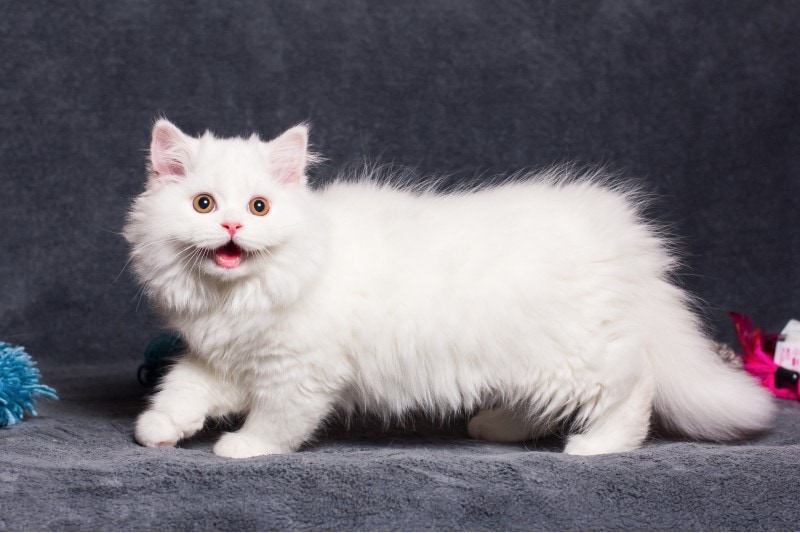
3. Munchkin cats often stand up like rabbits
Munchkin cats are already insanely cute as they are, but wait until you see one stand on its tiny hind legs. They look exactly like bunnies! Standing like this helps the Munchkin gain an extra few inches of height and keeps their short legs from getting tired as quickly. It may also be a ploy to get more treats and pets—try resisting a Munchkin standing in front of you!
Temperament & Intelligence of the Long-Haired Munchkin Cat
The Long-haired Munchkin cat’s short stature is a stark contrast to its personality. This is a confident, playful, and infinitely curious cat. Munchkins will explore every bit of your home and be the first to greet a visitor or investigate a strange noise. They’re also quite vocal and love to chirp, yowl, and purr their way into your heart.
While they’re smart, these cats love playing more than learning commands. They’d much rather chase a toy, take corners at full speed, and calculate how they can launch themselves from the floor to the top of the bookshelf than learn how to fetch or come when called.
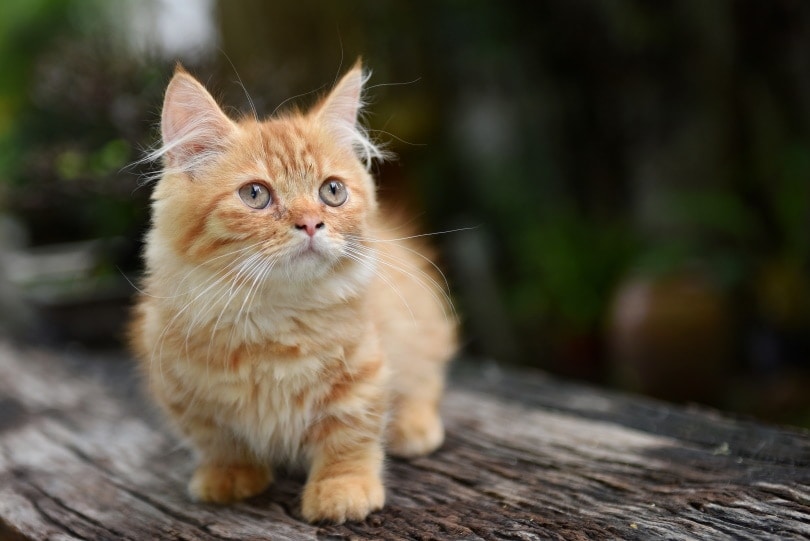
Are These Cats Good for Families? 👪
Yes! Long-haired Munchkin cats are an excellent choice for a family pet. They’re very sociable and love being around people. Since they’re so active and full of energy, they especially love children. After all, they’re the ones more likely to engage in a game or two!
Be careful when introducing toddlers and younger children to a Long-haired Munchkin cat, though. These cats are small and delicate, so it’s important to make sure kids understand how to handle them gently. Playing too rough with a Munchkin can easily result in injury.
Does This Cat Breed Get Along With Other Pets?
They do! Munchkins tend to view everyone as a playmate, whether that’s another cat, a dog, or any other household pet. But just like any other cat, Munchkins still retain their predatory instincts. To be on the safe side, keep them away from prey animals like hamsters and mice.
If you have dogs, train them to be gentle when interacting with your Munchkin. Dogs tend to play rough, and they have no idea that a small cat, especially one as delicate as a Munchkin, can be injured by a casual wrestle. With proper introduction and supervision, though, you should have no problem ensuring that your Munchkin and other pets get along just fine.
Things to Know When Owning a Long-Haired Munchkin:
Food & Diet Requirements 🐡
Like all cats, Long-haired Munchkins need a diet that caters to their obligate carnivore status. Their regular meals should consist of at least 40% protein and less than 10% carbohydrates. This also ensures that they get the required amount of taurine, which cats can’t synthesize on their own.
Additionally, that protein component should come from animal sources like turkey, chicken, salmon, and beef. Never put a Munchkin, or any cat for that matter, on a vegetarian diet. It ignores their natural nutritional needs and can actually be dangerous. The feline digestive system is not built to digest large amounts of plant matter, including grains, veggies, and fruits. Feeding them too much plant matter can result in all sorts of health issues like intestinal blockage, bloat, constipation, and even a weakened immune system.
For extra hydration, offer your Munchkin a mix of wet and dry food. Wet food contains more water than dry kibbles do, which helps keep your cat’s urinary tract healthy. It also introduces variety to their meals, which can make them a lot more exciting—and often tastier!
As for treats, the protein-to-carb ratio applies here, too. Only give your Long-haired Munchkin treats that are specifically formulated for cats. Some great options are salmon jerky, freeze-dried chicken, and freeze-dried tuna.
To help your Long-haired kitty stay healthy, consider giving them bone and joint supplements. Their joints are already more delicate than most breeds, so keeping up with their calcium needs will help them avoid developing any painful conditions like arthritis later in life (or slow it down).
If your Munchkin is overweight or underweight, you should consult your vet about adjusting their caloric intake so that it matches their activity level.
Exercise 🐈
Long-haired Munchkin cats are blessed with loads of energy, so they need plenty of play time. Invest in some kitty toys, such as laser pointers, catnip toys, feather wands, and hide-and-seek tunnels. Don’t forget to rotate the toys to keep your Munchkin from getting bored!
Watch out for jumping shenanigans, though. Munchkins think they’re no different than other cats, so they will attempt to jump and climb to impossible heights. Unfortunately, they’re physically not capable of doing this safely 100% of the time. Try placing cat trees of various heights and with plenty of steps in strategic locations to help them get around safely and without injury.
Training 🧶
Munchkin cats are quick learners, but their confidence also means they can be stubborn. Bypass this by harnessing their playfulness when teaching them commands. For instance, teach them the concept of fetch by making them chase a toy, bringing it back to you, then throwing it to make them fetch again.
Or, since they love to zoom around, call their name, then make them run after you. Reward them when they reach you. Say their name, run again, and reward! Pretty soon, they’ll associate you calling their name with three awesome things: playtime with their human, running, and treats!
Grooming ✂️
A Long-haired Munchkin cat needs more grooming than its short-haired counterparts. Brushing their coat at least twice a week, and daily if you can manage it, will help keep their fur soft and prevent matting. This will also stimulate the natural oils in their coats, keeping them healthy.
Bathing should be done sparingly. Healthy cats are capable of grooming themselves, and frequent baths can strip the oils off their skin and fur. Still, all that long fur can get dirty, so do spot-cleaning when necessary.
Clean their ears regularly with a cotton ball and medicated ear cleaner. Monitor their eyes for any debris that could cause infection, and wipe any gunk as soon as you see it.
Finally, trimming their nails is important for both their safety and your furniture. If you don’t feel confident about doing it yourself, consider taking them to the groomer for a trim.
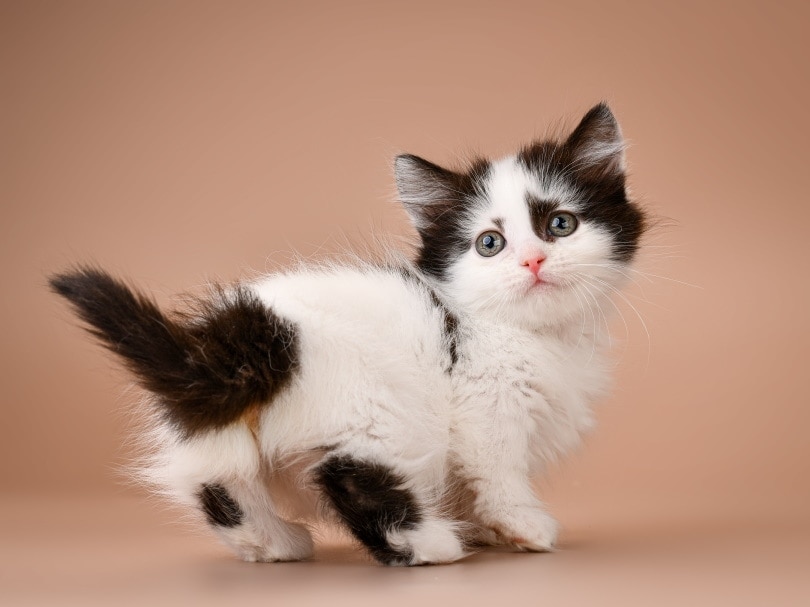
Health and Conditions 🏥
The defining feature of Munchkin cats—their stubby legs—is caused by a genetic mutation that prevents their legs from growing normally. This can predispose them to bone and joint issues while giving them limited mobility.
This is the reason why the Munchkin cat breed is such a hot topic among cat fanciers. These cats are often labeled as “disabled” or even “deformed” by critics. Some also consider breeding Munchkins as unethical because it encourages physical deformities.
To date, only the International Cat Association (TICA) has officially recognized the Munchkin cat breed. Other major associations like the American Cat Fanciers Association (ACFA) and the Cat Fanciers Association (CFA) still refuse to accept them.
That being said, Long-haired Munchkin cats can definitely live long and healthy lives—as long as 15 years! To help them get there, it’s important to be aware of certain health conditions that are more common in this breed. These include:
- Feline Obesity
- Patellar Luxation
- Osteoarthritis
- Lordosis
Feline Obesity
Like all cats, Munchkins can become obese if they don’t get enough exercise or are fed an unhealthy diet full of carbs and empty calories. This can put them at a greater risk for other health conditions, so be sure to feed them a healthy diet with only occasional treats, monitor their weight, and encourage plenty of physical activity.
Getting your Long-haired Munchkin cat from a reputable breeder, feeding them a high-quality diet, and taking them to the vet for regular checkups are all ways to ensure a long and healthy life for your furry friend. This will also help you spot budding health issues before they become serious and get your Munchkin on a treatment plan as soon as possible. With proper care, your Munchkin cat will be a loving and loyal companion for many years to come!
Patellar Luxation
Due to their short legs, the impact of jumping and running can cause the kneecaps to slip out of place. This condition is called patellar luxation and, if left untreated, can cause chronic pain and arthritis.
Osteoarthritis
Munchkins can be prone to this degenerative joint disease. Arthritis in cats is caused by the cartilage in the joints wearing away and leads to pain, stiffness and lameness.
Lordosis
Characterized by an abnormal curving of the spine, lordosis is caused by spinal muscles that are too short. This can cause back pain and difficulty in walking and jumping.
Male vs Female
There is no difference in temperament between male and female Munchkin cats. However, male cats usually have larger bodies, but not by much.
To keep behavioral problems down and prevent certain diseases, consider spaying or neutering your Long-haired Munchkin cat. For males, this will help prevent them from spraying and marking their territory, as well as roaming and fighting with other cats.
For females, this eliminates the risk of developing conditions like a life-threatening infection of the uterus called pyometra plus uterine and ovarian cancers.
Final Thoughts
The Long-haired Munchkin cat is a beautiful and unique breed bursting with personality. Those stubby legs won’t stop them from turning your house upside down! They get along swimmingly with people and pets, and they’re just as game for a race as they are for a nice cuddle.
However, they may be prone to certain health conditions due to their unique body types, and it’s important to be prepared for that. With proper care and lots of love, you can look forward to many happy years with the adorable Munchkin cat.
Featured Image Credit: This road is mine, Shutterstock


